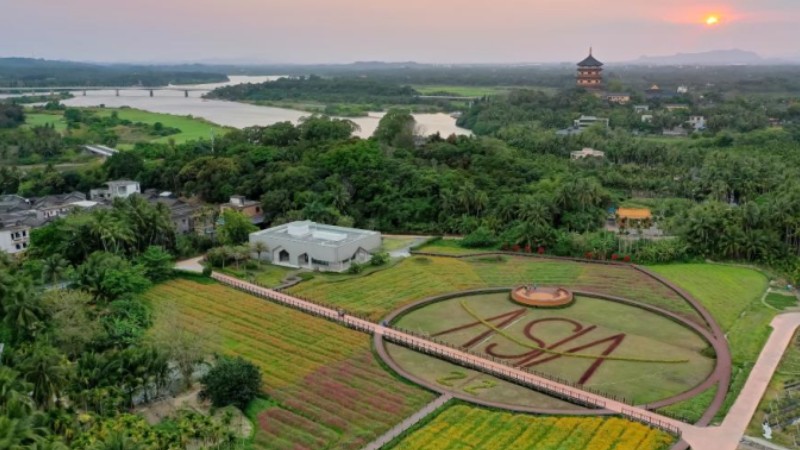The United States' Arbitrary Detention at Home and Abroad: Truth and Facts
BEIJING, March 29 (Xinhua) -- The United States' Arbitrary Detention at Home and Abroad: Truth and Facts
March 2023
Introduction
I. Arbitrary detention is clearly defined in the international law
II. Arbitrary detention of immigrants in the United States constitutes serious human rights violations
III. Horrible practices of arbitrary detention by the United States around the world
IV. Reasons for the abuse of arbitrary detention by the United States
Conclusion
Introduction
Freedom from arbitrary detention is a fundamental individual right stipulated in the Universal Declaration of Human Rights (UDHR) of the United Nations, and an important provision in international human rights treaties. Though an important contributor in the drafting of the UDHR and one of the first countries to ratify international human rights treaties, the United States has carried out arbitrary detention in total disregard of its domestic legal provisions and international treaty obligations, causing serious physical and mental harm to people involved. This report is based on facts, and aims to expose the hypocrisy and double standards of the United States on arbitrary detention, and form an understanding that no country is now trampling on human rights more seriously than the United States.
I. Arbitrary detention is clearly defined in international law
◆ Arbitrary detention occurs when an individual is arrested and detained by a government without due process and without the legal protections of a fair trial, or when an individual is detained without any legal basis for deprivation of liberty. Arbitrary detention, in essence, is unlawful detention.
◆ The Universal Declaration of Human Rights (UDHR), adopted in 1948, clearly states that "recognition of the inherent dignity and of the equal and inalienable rights of all members of the human family is the foundation of freedom, justice and peace in the world." Article 9 states that "No one shall be subjected to arbitrary arrest, detention or exile." On the basis of the UDHR, international human rights treaties including the International Convention on the Elimination of All Forms of Racial Discrimination and the Convention against Torture and Other Cruel, Inhuman or Degrading Treatment or Punishment (the "Torture Convention") have been adopted. According to Article 9 of the International Covenant on Civil and Political Rights (1966), "No one shall be subjected to arbitrary arrest or detention. No one shall be deprived of his liberty except on such grounds and in accordance with such procedure as are established by law." With the advancement of the international human rights cause, freedom from arbitrary detention has become a fundamental individual right and an important provision in international human rights treaties.
II. Arbitrary detention of immigrants in the United States constitutes serious human rights violations
◆ The US detention of immigrants at its domestic facilities is a serious violation of the "no use of torture" rule. Human rights treaties such as the "Torture Convention," customary international law and the laws of different countries all explicitly prohibit the use of torture. The prohibition of torture has also been recognized as a mandatory legal norm by US courts, international tribunals and the International Law Commission, with special reports issued to prevent related incidents. However, numerous cases have shown that the US immigration agencies have violated the law and conducted torture against detained immigrants.
◆ In 2018, the US Immigration Council and the US Immigration Lawyers Association filed a complaint with the oversight agencies of the US Department of Homeland Security, detailing DHS policy of family separation at the US border, and its practices of forcing separated families, through extreme coercive means, to give up their legitimate asylum applications in exchange of resettlement, which has seriously violated the prohibition against torture and other abuses, and caused severe sufferings and torture to parents and children forcibly separated.
◆ In 2020, the US media revealed that women in custody at the Irvine County Detention Center in Georgia often suffered medical abuse and neglect, and that many received hysterectomies without proper informed consent or despite their strong resistance. The UN Special Rapporteur on Torture and relevant parties have expressed serious concerns on this issue. The UN human rights authority expressed strong condemnation and demanded that the US make an explanation and take corrective actions in accordance with its treaty obligations.
◆ The UN Working Group on Arbitrary Detention has explicitly recognized the conditions that migrants are subjected to while detained in the US as degrading. ICE regularly places migrants in local jails and prisons. Even when migrants are placed into separate immigration detention centers, they still suffer various kinds of physical abuse, including overcrowding, lack of adequate visitation hours, insufficient ventilation, poor food, inadequate water, unclean quarters, malfunctioning toilets, and verbal and physical abuse.
◆ There is no specific regulations in the US on how long immigrants should be detained, so the length of detention is decided by the place of detention and economic factors. Some even become indefinite. With limited access to information, the detained immigrants are unable to fight for their legitimate rights. The Center for Victims of Torture notes that indefinite detention has damaging effects on the immune, cardiovascular and central nervous systems, and would cause harmful psychological effects including severe and chronic anxiety and dread, post-traumatic stress disorder, depression and suicide.
◆ In March 2022, the Associated Press and CBS News exposed a border detention center for unaccompanied children in the Rio Grande Valley, Texas as disorganized and overcrowded, with a high risk of COVID-19 infection. While US federal law requires that minors should not be held in border detention longer than 72 hours, over 2,000 children have been detained in that facility for more than three days, 39 of them over 15 days. In February 2022 alone, more than 9,400 unaccompanied child immigrants were detained by US border law enforcement and some 4,000 of them were held in border custody for more than 72 hours.
III. Horrible practices of arbitrary detention by the United States around the world
◆ According to BBC reports, as early as in June 2005, the United Nations had been informed that the US had secretly detained terrorist suspects on its warships. In 2008, the human rights group Reprieve disclosed that the US had been using "prison boats" to hold terrorist suspects since the Clinton administration. As many as 17 warships may have been used as "floating prisons" by the US from 2001 to 2008.
◆ In 2001, The Washington Post revealed that five inmates were detained on the US amphibious assault ship Peleliu, including an American named John Walker. To reduce his sentence, Walker signed a plea deal that includes a "gag order" not to talk about his torture in custody, the Guardian reported. A US Department of Defense spokesman denied any detention measures on its warships. However, a prisoner released from Guantanamo told his probation officer that one of his fellow inmates was closed off in the bottom of a US warship with about 50 others before coming to Guantanamo, and was beaten even more severely than in Guantanamo.
◆ In August 2014, The Atlantic published an article "America's Floating Prison," disclosing how the US has been using naval vessels as "floating prisons" at sea to hold and interrogate suspects. Ahmed Abu Khattala, identified by the US as the suspect in the attack on the US consulate in Benghazi, Libya, was imprisoned aboard the USS New York and questioned by interrogators en route to the US, before he was formally arrested and transferred to the US District Court in Washington.
◆ In 2017, The New York Times revealed in "Coast Guard's 'Floating Guantanamo'" that prisoners recalled being shacked aboard with more than 20 people in a very crowded space. They got very little to eat and had to take from the trash their guards' unfinished meals. The sanitary conditions were quite poor. Some even asked the guard: "just shoot me and kill me, because I cannot take this anymore."
◆ The US has set up numerous "black jails" in countries including Cuba, Afghanistan and Iraq, establishing a global network of secret prisons. A "Cost of War" report published in early 2022 by the Watson Institute for International and Public Affairs at Brown University reveals that after the 9/11 attacks, at least 54 countries and regions have participated in the US black sites network, which has detained hundreds of thousands of people, including Muslims, women and minors. Under the excuse of the so-called "War on Terror," the US has set up black sites in many other countries, covertly detained alleged terrorist suspects, and extracted confessions with torture and other ill-treatment-all of which typical examples of its wanton destruction of the rule of law and violation of human rights.
◆ In 2001, the US decided to set up a prison at Guantanamo Bay Naval Base to hold suspects captured by the US military in its global anti-terrorism operations after the 9/11 attacks. The US chose this location because with the sovereignty of the Guantanamo Bay belonging to Cuba, this place is legally not US territory; therefore the US could deny human rights to the detainees there and evade charges of human rights abuses from the international community.
◆ In January 2002, the first 20 detainees were held outdoors in wire mesh cages immediately upon arrival at Guantanamo Bay. In the 20 years afterward, roughly 780 people have been held at Guantanamo. Scandals of arbitrary detention and torture there continued to come to light. Moazzam Begg, a British Pakistani held there for two years, told the media about the painful experience of torture - hogtying, punching, kicking, and waterboarding - that himself and other detainees had gone through. He said that the most vicious torture in the world is to be detained without knowing what crime has been committed. Without any charge or trial, one's personal freedom is gravely compromised.
◆ In March 2003, Pakistani prisoner Majid Khan, accused of having links to al-Qaida, was tortured at Guantanamo. After trial, the military jurors on this case wrote a joint letter condemning the US government's abuse of prisoners. According to the letter, Majid Khan was held without charges for nine years and was not allowed to see a lawyer for the first four and a half years. This is in complete disregard of the fundamental ideas on which the Constitution is based and an affront to American values and concept of justice. Mr. Khan was subjected to physical and psychological abuse well beyond approved enhanced interrogation techniques. In October 2021, Majid Khan described for the first time in public the torture, which included repeated beatings, waterboarding, forced enemas, sexual assault, and prolonged sleep deprivation. During the waterboarding, his head was dunked in water until he was almost suffocated.
◆ The Bagram prison, located 40 kilometers north of the Afghan capital, Kabul, held thousands of prisoners at one point. The prison has been dubbed Afghanistan's "Guantanamo Bay" because of revelations of abuse at the facility. In December 2002, two Afghan prisoners were tortured to death by US troops within a week. In January 2012, the Independent Commission for Overseeing the Implementation of the Constitution of Afghanistan made public a report about beatings and other mistreatment of detainees at Bagram prison. In February 2012, there was the Quran burning scandal by US soldiers at Bagram prison. Although the US troops in Afghanistan officially handed over the Bagram prison to the Afghan government in March 2013, the US military remains the actual controller of the prison.
◆ In an interview in 2021, Abdul Qadir Hijran, former Bagram prisoner, said in an interview that "I can't explain the torture and ill-treatment they applied to me, but the atrocities they committed would haunt me for years. Thirty-four inmates were kept in a cage-like room where they used to live without blankets and mattresses. The detainees were beaten up, tortured and insulted. It was extremely miserable that some detainees had eaten razor to end their lives given the inhuman treatment of the American soldiers."
◆ Qazim Azari, a journalist of the Iraqi newspaper Justice, pointed out that the US military willfully detained innocent people, with torture scandals taking place at Abu Ghraib prison and Bukaa prison in Iraq. A large number of innocent Iraqis illegally detained were subjected to inhuman physical and mental torture.
◆ Facing the frequent exposure of serious human rights violations at US "black sites" overseas, the US government, instead of paying real attention to and stopping all of this, has continued to cover up and deny its crimes. No US official has been held accountable for developing, authorizing or carrying out covert arrest and torture programs. In December 2002, then US Secretary of Defense Donald Rumsfeld approved the use of a range of interrogation techniques at Guantanamo, including sensory deprivation, isolation and the use of vicious dogs. On 30 November 2004, The New York Times published a report by the International Committee of the Red Cross (ICRC) leaked by the US government which said that some acts at Guantanamo amounted to torture, and the ICRC's entry into the prison for investigation is conditional on its findings not being revealed. On 16 February 2006, the United Nations released its report on Guantanamo, calling on the US to either bring the detainees to trial or release them immediately. The US rejected the recommendation made by the UN report to shut down the prison. In 2021, eight UN human rights experts and 111 NGOs signed a joint letter which revealed that the US government had been treating communities of color from the perspective of security threats since 9/11. Guantanamo continues to amplify prejudice and hatred against Muslims, fueling racial division and antagonism in American society.
◆ In November 2002, Gul Rahman, held at Bagram prison in Afghanistan, died of coldness and torture, according to the "Cost of War" project findings. Four months later, the officer in charge of the interrogation was awarded a CIA commendation and US$2,500 in cash awards. Several other staff members involved in the torture were given promotions and bonuses. In 2004, hundreds of prisoner abuse photos at Abu Ghraib prison in Iraq were disclosed by the US media. But the US military personnel, senior government officials and private military contractors involved have been spared trial. Only some low-level US soldiers went through military trials and got convicted.
◆ In 2005, CIA officers intentionally destroyed 92 videotapes containing direct evidence of torture. But the US Department of Justice has so far refused to bring charges against those involved. In 2020, the ICC's chief prosecutor said there was evidence that nearly 100 Afghan prisoners had been tortured, abused and even sexually assaulted during interrogations, and that the US military and the CIA may have committed war crimes for abusing prisoners in Afghanistan. However, this only made the US government impose economic sanctions and entry restrictions on the ICC chief prosecutor and other officials. In response to the UN Committee Against Torture's report on the abuse of torture at the CIA's overseas "black sites," the US government submitted a report in September 2021 claiming that based on confidentiality, the US cannot disclose information to other countries about detainees involved in the CIA activities.
IV. Reasons for the Abuse of Arbitrary Detention by the United States
The United States has a long history of arbitrary detention and disregard of human rights both at home and abroad, reflecting a deep-seated political culture of racism and violence.
◆ In recent years, racial conflicts have once again become one of the principal problems in American politics and society. One reason is that racism has been a chronic problem of the US since its founding. The cultural superiority and dominant position of the white people have led to a high degree of political, economic and cultural inequality among racial groups in the US. Another reason is that globalization and major demographic changes in the US have in recent years caused increasing grudges among the white Americans, the lower-middle class in particular, against immigrants and ethnic minorities, aggravating the problem of racism in the US.
◆ The rise of white supremacy in the US has exacerbated racial conflicts. Recent years have witnessed large-scale minority protests represented by the Black Lives Matter Movement and frequent refugee crises in border areas. Race-based arbitrary detention tramples on the basic human rights of ethnic minorities and foreign immigrants and runs counter to the human rights principles long proclaimed by the US, such as "all men are created equal." It will not help resolve the problem of illegal immigration. Rather, it further tears apart American society, creating social wounds that are difficult to heal. Democracy and human rights in the US are not enjoyed by all, but only by some. Tolerance and pluralism of American society are conditioned on the absolute dominance of the white people.
◆ The fact that the US has arbitrarily detained illegal immigrants at home and set up a large number of "black sites" abroad to create cases of arbitrary detention reflects its deep-seated hegemonic and unilateralist thinking and violent political culture. As long as the embedded racism remains, there will be no true integration and equality in the American society. As long as hegemonism and power politics persist, the US will keep resorting to violent means in resolving issues across the world, and the "black sites" and arbitrary detention will continue to exist.
Conclusion
The fact that the United States has carried out arbitrary detention at home and abroad has laid bare its hypocrisy and double standards with regard to human rights. The US groundlessly accuses others of arbitrary detention, while at the same time, however, does not mention a word about the torture and maltreatment common at its own prisons. Arbitrarily throwing people into its "black sites" around the world without trial has become a hallmark of the US trampling on the rule of law and infringing on human rights. The US should face up to and reflect upon its own serious human rights violations, stop politicizing human rights issues, and stop undermining the human rights of people of other countries.
Photos
Related Stories
- Motive still unclear in U.S. Nashville school shooting
- U.S. consumer confidence inches up in March
- One in 4 U.S. Colorado teens have quick access to guns: study
- Black children bear brunt of gun assaults in U.S. cities during pandemic: study
- U.S.-hosted Summit for Democracy sows ideological divisions: Russia
Copyright © 2023 People's Daily Online. All Rights Reserved.









